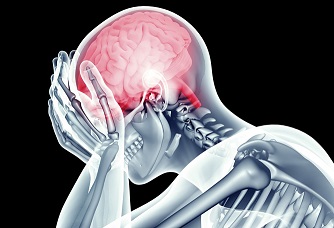Neuronal and Glial Metabolite Abnormalities Unveiled in Post-COVID Neuropsychiatric Symptoms - A Breakthrough Study by University of Maryland
Thailand Medical News Team Aug 08, 2023 2 years, 6 months, 6 days, 5 hours, 34 minutes ago
COVID-19 Research: The aftermath of the coronavirus disease 2019 (COVID-19) pandemic has revealed a complex web of health repercussions, extending beyond the initial respiratory symptoms that characterize the infection. As scientists and medical professionals around the world grapple with understanding the diverse range of post-COVID conditions, a groundbreaking study conducted by the University of Maryland School of Medicine sheds light on the neurometabolite abnormalities observed in individuals experiencing persistent neuropsychiatric symptoms after recovering from COVID-19.

The
COVID-19 Research team sought to uncover potential neuroinflammation and neuronal injury markers in post-COVID individuals who continued to suffer from neuropsychiatric symptoms even after overcoming the acute phase of the infection. Employing proton magnetic resonance spectroscopy (1H-MRS) at 3-Tesla, the researchers delved into the concentrations of neurometabolites in specific brain regions, shedding light on potential abnormalities.
Intriguingly, the research team evaluated 54 participants, including 29 post-COVID individuals and 25 controls. The post-COVID group, with an average age of 42.4 years and an average of 8 months since COVID-19 diagnosis, exhibited distinct metabolic alterations compared to the control group. Notably, the post-COVID participants displayed lower levels of total N-acetyl compounds ([tNAA]) in both the anterior cingulate cortex-gray matter (ACC-GM) and frontal white matter (FWM), signifying potential neuronal injury.
Furthermore, the team discovered that glutamate and glutamine ([Glu + Gln]) levels were notably diminished in the FWM of the post-COVID group, suggesting ongoing neuronal damage or loss. These findings echoed patterns observed in other neurological disorders, such as Alzheimer's disease and HIV-associated neurocognitive disorders, underlining the potential significance of these neurometabolite changes.
Intriguingly, the study also investigated the levels of myo-inositol ([mI]), a glial marker associated with neuroinflammation, oxidative stress, and glial dysfunction. Surprisingly, the post-COVID individuals exhibited lower [mI] levels, defying expectations of heightened glial activation. This unexpected result prompted the researchers to speculate that glial dystrophy or dysfunction might underlie this phenomenon, potentially contributing to persistent neuropsychiatric symptoms.
The study's observations extended to the impact of disease severity on neuronal and glial metabolite levels. Hospitalized post-COVID patients displayed age-related increases in [mI], choline compounds ([Cho]), and total creatine ([tCr]). These markers, typically elevated in neuroinflammatory conditions, suggested ongoing glial activation in severe cases. Meanwhile, non-hospitalized post-COVID patients exhibited more pronounced reductions in neurometabolites associated with glial activity, pointing towards a potential link between glial dystrophy and lingering neuropsychiatric symptoms.
As the researchers explored the relationship between neurometabolite levels and cognitive function, motor abilities, and pain perception, intriguing patterns emerged
. Lower [tNAA] levels were correlated with poorer cognitive performance, indicating the possible impact of neuronal injury on cognitive functioning. Similarly, reduced [mI] levels were associated with greater pain intensity, echoing findings in other pain-related conditions.
The implications of this study are far-reaching, shedding light on the intricate interplay between COVID-19 infection, neurological alterations, and persistent neuropsychiatric symptoms. The discovery of neuronal injury markers and glial dysfunction in post-COVID individuals offers crucial insights into the long-term effects of the pandemic on brain health.
While much remains to be elucidated about the exact mechanisms underlying these neurometabolite abnormalities, the study underscores the necessity of continued research into the neurological sequelae of COVID-19. The findings encourage further exploration into potential therapeutic strategies aimed at mitigating the neuronal and glial changes observed in post-COVID individuals, with the ultimate goal of improving the quality of life for those grappling with lingering neuropsychiatric symptoms.
The study findings were published in the peer reviewed journal: the Journal of Infectious Diseases.
https://academic.oup.com/jid/advance-article/doi/10.1093/infdis/jiad309/7237266
For the latest
COVID-19 Research, keep on logging to Thailand Medical News.
